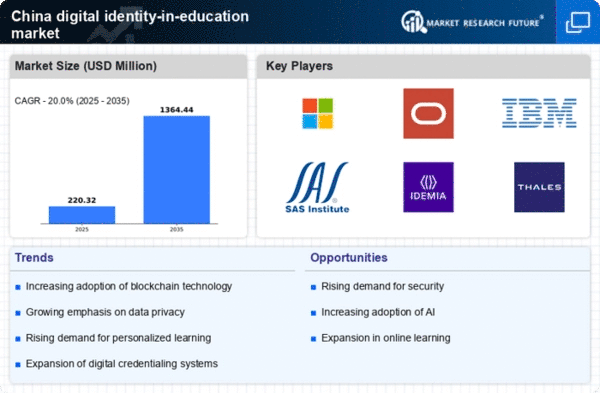Government Initiatives and Support
In China, government initiatives aimed at enhancing the educational landscape are significantly influencing the digital identity-in-education market. The Chinese government has been actively promoting the use of technology in education, with policies that encourage the adoption of digital identity solutions. For instance, the Ministry of Education has allocated substantial funding to support the development of digital infrastructure in schools. This funding is expected to reach approximately $1 billion by 2026, indicating a strong commitment to integrating technology into education. Such initiatives not only facilitate the implementation of digital identity systems but also ensure that educational institutions are equipped with the necessary resources to adopt these technologies. Consequently, the digital identity-in-education market is likely to benefit from increased government support, fostering innovation and growth within the sector.
Rising Demand for Personalized Learning
The digital identity-in-education market in China is shifting towards personalized learning solutions. As educational institutions increasingly recognize the importance of tailoring educational experiences to individual student needs, the demand for digital identity solutions that facilitate this personalization is likely to grow. Reports indicate that approximately 70% of educators believe personalized learning enhances student engagement and outcomes. This trend suggests that digital identity systems, which can track and analyze student performance and preferences, will become essential tools in the educational landscape. Furthermore, the integration of these systems can lead to improved learning pathways, thereby enhancing the overall effectiveness of educational programs. As a result, the digital identity-in-education market is poised for expansion, driven by the need for customized educational experiences that cater to diverse learning styles.
Increased Investment in EdTech Solutions
Investment in educational technology (EdTech) is on the rise in China, significantly impacting the digital identity-in-education market. Venture capital funding for EdTech startups has surged, with investments reaching approximately $3 billion in 2025 alone. This influx of capital is likely to accelerate the development of innovative digital identity solutions tailored for educational purposes. As educational institutions seek to enhance their technological capabilities, the integration of digital identity systems becomes increasingly vital. These systems not only streamline administrative processes but also provide valuable insights into student performance and engagement. Consequently, the digital identity-in-education market is expected to thrive as educational institutions leverage EdTech investments to implement advanced identity management solutions.
Growing Emphasis on Data Privacy Regulations
The digital identity-in-education market in China is increasingly shaped by the growing emphasis on data privacy regulations. With the implementation of stricter data protection laws, educational institutions are compelled to adopt robust digital identity solutions that ensure compliance with these regulations. The Personal Information Protection Law (PIPL), enacted in 2021, mandates that organizations, including educational institutions, prioritize the security and privacy of personal data. This legal framework is likely to drive the demand for digital identity systems that not only protect student information but also enhance trust among stakeholders. As institutions strive to align with these regulations, the digital identity-in-education market may witness a surge in the adoption of secure identity management solutions, thereby fostering a safer educational environment.
Shift Towards Remote and Hybrid Learning Models
The shift towards remote and hybrid learning models in China is reshaping the digital identity-in-education market. As educational institutions adapt to new teaching methodologies, the need for effective digital identity solutions becomes paramount. These solutions facilitate secure access to online learning platforms, ensuring that only authorized users can participate in educational activities. Reports indicate that approximately 60% of schools in China have adopted hybrid learning models, which necessitate robust digital identity management systems. Such systems not only enhance security but also improve the overall learning experience by providing seamless access to educational resources. As the trend towards remote learning continues, the digital identity-in-education market is likely to expand, driven by the demand for secure and efficient identity management solutions.
















